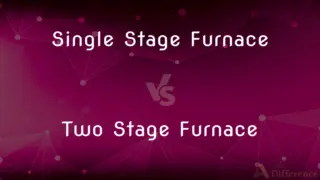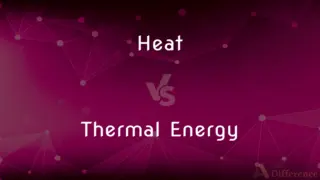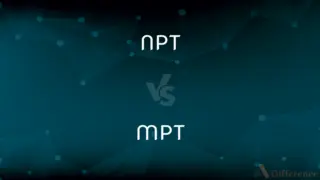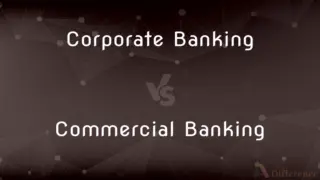Abstract vs. Concrete — What's the Difference?
Edited by Tayyaba Rehman — By Maham Liaqat — Updated on April 15, 2024
Abstract concepts rely on ideas without physical forms, while concrete items are tangible and perceptible by the senses.

Difference Between Abstract and Concrete
Table of Contents
ADVERTISEMENT
Key Differences
Abstract concepts, such as justice or freedom, exist independently of the physical world, focusing on ideas that do not have a material form. On the other hand, concrete terms refer to objects or phenomena that are directly observable and measurable, like a book or a tree.
The understanding of abstract terms requires mental processes and often varies among different individuals or cultures, while concrete items can be consistently recognized and are less subject to personal interpretation.
Abstract concepts often serve as the building blocks for deeper reasoning and complex thought in fields such as philosophy or mathematics. Whereas, concrete terms are essential in daily life and practical activities, aiding in clear and direct communication.
Abstract terms can be challenging to teach because they necessitate a level of conceptual thinking that might not be as readily accessible to all learners. Conversely, concrete items can be demonstrated through direct interaction, making them easier to comprehend and use in teaching.
In literature and the arts, abstract ideas may be symbolized through various forms, creating layers of meaning that interpret differently. In contrast, concrete descriptions in these fields provide clarity and immediacy, grounding the reader's or viewer's experience in the familiar.
ADVERTISEMENT
Comparison Chart
Definition
Pertaining to ideas or concepts not physically tangible.
Refers to objects or elements that can be perceived physically.
Examples
Freedom, love, justice.
Chair, apple, mountain.
Usage in Speech
Often used in philosophical or theoretical discussions.
Common in everyday, practical conversations.
Cognitive Processing
Requires higher-level abstract thinking.
Involves sensory experience and direct observation.
Teachability
Can be difficult to teach without using metaphors or analogies.
Easier to teach through direct experience or demonstration.
Compare with Definitions
Abstract
Theoretical and not linked to practical use.
Her abstract on quantum mechanics is difficult for laypeople to understand.
Concrete
Existing in a material or physical form.
Concrete barriers block the road construction area.
Abstract
Pertaining to ideas not physically existent.
The concept of beauty is abstract and varies widely.
Concrete
Pertaining to an actual substance or thing as opposed to an abstract quality.
The concrete floor needs to be repaved.
Abstract
Existing in thought as an idea but not having a physical or concrete existence.
Justice is an abstract concept that everyone interprets differently.
Concrete
Relating to real, tangible objects.
Concrete examples help clarify complex theories.
Abstract
Not concrete or related to tangible things.
Abstract art uses forms and colors to evoke emotions.
Concrete
Real, not abstract or theoretical.
The scientist needs concrete evidence to support her hypothesis.
Abstract
Relating to general ideas or qualities rather than specific objects.
Abstract thinking is crucial in solving complex problems.
Concrete
Specific and definite rather than abstract.
Give me a concrete answer, not more theories.
Abstract
Considered apart from concrete existence
An abstract concept.
Concrete
Concrete is a composite material composed of fine and coarse aggregate bonded together with a fluid cement (cement paste) that hardens (cures) over time. In the past, lime based cement binders, such as lime putty, were often used but sometimes with other hydraulic cements, such as a calcium aluminate cement or with Portland cement to form Portland cement concrete (named for its visual resemblance to Portland stone).
Abstract
Not applied or practical; theoretical.
Concrete
Existing in a material or physical form; not abstract
Concrete objects like stones
Abstract
Difficult to understand; abstruse
Abstract philosophical problems.
Concrete
A building material made from a mixture of broken stone or gravel, sand, cement, and water, which can be spread or poured into moulds and forms a mass resembling stone on hardening
Slabs of concrete
Concrete blocks
Abstract
Denoting something that is immaterial, conceptual, or nonspecific, as an idea or quality
Abstract words like truth and justice.
Concrete
Cover (an area) with concrete
The precious English countryside may soon be concreted over
Abstract
Impersonal, as in attitude or views.
Concrete
Form (something) into a mass; solidify
The juices of the plants are concreted upon the surface
Abstract
Having an intellectual and affective artistic content that depends solely on intrinsic form rather than on narrative content or pictorial representation
Abstract painting and sculpture.
Concrete
Of or relating to an actual, specific thing or instance; particular
Had the concrete evidence needed to convict.
Abstract
A statement summarizing the important points of a text.
Concrete
Relating to nouns, such as flower or rain, that denote a material or tangible object or phenomenon.
Abstract
Something abstract.
Concrete
Existing in reality or in real experience; perceptible by the senses; real
Concrete objects such as trees.
Abstract
An abstract of title.
Concrete
Formed by the coalescence of separate particles or parts into one mass; solid.
Abstract
To take away; remove
Abstract the most important data from a set of records.
Concrete
Made of hard, strong, conglomerate construction material.
Abstract
To remove without permission; steal
A painting that was abstracted from the museum.
Concrete
A hard, strong construction material consisting of sand, conglomerate gravel, pebbles, broken stone, or slag in a mortar or cement matrix.
Abstract
To consider (an idea, for example) as separate from particular examples or objects
Abstract a principle of arrangement from a series of items.
Concrete
A mass formed by the coalescence of particles.
Abstract
(ăbstrăkt′) To write a summary of; summarize
Abstract a long article in a paragraph.
Concrete
To build, treat, or cover with hard, strong conglomerate construction material.
Abstract
To create artistic abstractions of (something else, such as a concrete object or another style)
"The Bauhaus Functionalists were ... busy unornamenting and abstracting modern architecture, painting and design" (John Barth).
Concrete
To form into a mass by coalescence or cohesion of particles or parts.
Abstract
An abridgement or summary of a longer publication.
Concrete
To harden; solidify.
Abstract
Something that concentrates in itself the qualities of a larger item, or multiple items.
Concrete
Real, actual, tangible.
Fuzzy videotapes and distorted sound recordings are not concrete evidence that Bigfoot exists.
Once arrested, I realized that handcuffs are concrete, even if my concept of what is legal wasn’t.
Abstract
Concentrated essence of a product.
Concrete
Being or applying to actual things, not abstract qualities or categories.
Abstract
(medicine) A powdered solid extract of a medicinal substance mixed with lactose.
Concrete
Particular, specific, rather than general.
While everyone else offered thoughts and prayers, she made a concrete proposal to help.
Concrete ideas
Abstract
An abstraction; an abstract term; that which is abstract.
Concrete
United by coalescence of separate particles, or liquid, into one mass or solid.
Abstract
The theoretical way of looking at things; something that exists only in idealized form.
Concrete
Made of concrete, a building material.
The office building had concrete flower boxes out front.
Abstract
(arts) An abstract work of art.
Concrete
(obsolete) A solid mass formed by the coalescence of separate particles; a compound substance, a concretion.
Abstract
(real estate) A summary title of the key points detailing a tract of land, for ownership; abstract of title.
Concrete
Specifically, a building material created by mixing cement, water, and aggregate such as gravel and sand.
The road was made of concrete that had been poured in large slabs.
Abstract
(obsolete) Derived; extracted.
Concrete
(logic) A term designating both a quality and the subject in which it exists; a concrete term.
Abstract
Drawn away; removed from; apart from; separate.
Concrete
Sugar boiled down from cane juice to a solid mass.
Abstract
Not concrete: conceptual, ideal.
Her new film is an abstract piece, combining elements of magic realism, flashbacks, and animation but with very little in terms of plot construction.
Concrete
(US) A dessert of frozen custard with various toppings.
Abstract
Insufficiently factual.
Concrete
(chemistry) An extract of herbal materials that has a semi-solid consistency, especially when such materials are partly aromatic.
Abstract
Apart from practice or reality; vague; theoretical; impersonal; not applied.
Concrete
To cover with or encase in concrete (building material).
I hate grass, so I concreted over my lawn.
Abstract
(grammar) As a noun, denoting a concept or intangible as opposed to an object, place, or person.
Concrete
To solidify: to change from being abstract to being concrete (actual, real).
Abstract
Difficult to understand; abstruse; hard to conceptualize.
The politician gave a somewhat abstract answer when asked about their plans to cut spending.
Concrete
To unite or coalesce into a mass or a solid body.
Abstract
Separately expressing a property or attribute of an object that is considered to be inherent to that object: attributive, ascriptive.
Concrete
United in growth; hence, formed by coalition of separate particles into one mass; united in a solid form.
The first concrete state, or consistent surface, of the chaos must be of the same figure as the last liquid state.
Abstract
Pertaining comprehensively to, or representing, a class or group of objects, as opposed to any specific object; considered apart from any application to a particular object: general, generic, nonspecific; representational.
Concrete
Standing for an object as it exists in nature, invested with all its qualities, as distinguished from standing for an attribute of an object; - opposed to abstract.
Concrete is opposed to abstract. The names of individuals are concrete, those of classes abstract.
Concrete terms, while they express the quality, do also express, or imply, or refer to, some subject to which it belongs.
Abstract
(archaic) Absent-minded.
Concrete
A compound or mass formed by concretion, spontaneous union, or coalescence of separate particles of matter in one body.
To divide all concretes, minerals and others, into the same number of distinct substances.
Abstract
(arts) Pertaining to the formal aspect of art, such as the lines, colors, shapes, and the relationships among them.
Concrete
A mixture of gravel, pebbles, or broken stone with cement or with tar, etc., used for sidewalks, roadways, foundations, etc., and esp. for submarine structures.
Abstract
Free from representational qualities, in particular the non-representational styles of the 20th century.
Concrete
A term designating both a quality and the subject in which it exists; a concrete term.
The concretes "father" and "son" have, or might have, the abstracts "paternity" and "filiety".
Abstract
(music) Absolute.
Concrete
Sugar boiled down from cane juice to a solid mass.
Abstract
(dance) Lacking a story.
Concrete
To unite or coalesce, as separate particles, into a mass or solid body.
Abstract
Being a partial basis for subclasses rather than a complete template for objects.
Concrete
To form into a mass, as by the cohesion or coalescence of separate particles.
There are in our inferior world divers bodies that are concreted out of others.
Abstract
(transitive) To separate; to disengage.
Concrete
To cover with, or form of, concrete, as a pavement.
Abstract
(transitive) To remove; to take away; withdraw.
Concrete
A strong hard building material composed of sand and gravel and cement and water
Abstract
To steal; to take away; to remove without permission.
Concrete
Cover with cement;
Concrete the walls
Abstract
(transitive) To summarize; to abridge; to epitomize.
Concrete
Form into a solid mass; coalesce
Abstract
To conceptualize an ideal subgroup by means of the generalization of an attribute, as follows: by apprehending an attribute inherent to one individual, then separating that attribute and contemplating it by itself, then conceiving of that attribute as a general quality, then despecifying that conceived quality with respect to several or many individuals, and by then ideating a group composed of those individuals perceived to possess said quality.
Concrete
Capable of being perceived by the senses; not abstract or imaginary;
Concrete objects such as trees
Abstract
To extract by means of distillation.
Concrete
Formed by the coalescence of particles
Abstract
(transitive) To consider abstractly; to contemplate separately or by itself; to consider theoretically; to look at as a general quality.
Abstract
To withdraw oneself; to retire.
Abstract
(transitive) To draw off (interest or attention).
He was wholly abstracted by other objects.
Abstract
To perform the process of abstraction.
Abstract
To create abstractions.
Abstract
To produce an abstraction, usually by refactoring existing code. Generally used with "out".
He abstracted out the square root function.
Abstract
Withdraw; separate.
The more abstract . . . we are from the body.
Abstract
Considered apart from any application to a particular object; separated from matter; existing in the mind only; as, abstract truth, abstract numbers. Hence: ideal; abstruse; difficult.
Abstract
Expressing a particular property of an object viewed apart from the other properties which constitute it; - opposed to concrete; as, honesty is an abstract word.
A concrete name is a name which stands for a thing; an abstract name which stands for an attribute of a thing. A practice has grown up in more modern times, which, if not introduced by Locke, has gained currency from his example, of applying the expression "abstract name" to all names which are the result of abstraction and generalization, and consequently to all general names, instead of confining it to the names of attributes.
Abstract
Abstracted; absent in mind.
Abstract
To withdraw; to separate; to take away.
He was incapable of forming any opinion or resolution abstracted from his own prejudices.
Abstract
To draw off in respect to interest or attention; as, his was wholly abstracted by other objects.
The young stranger had been abstracted and silent.
Abstract
To separate, as ideas, by the operation of the mind; to consider by itself; to contemplate separately, as a quality or attribute.
Abstract
To epitomize; to abridge.
Abstract
To take secretly or dishonestly; to purloin; as, to abstract goods from a parcel, or money from a till.
Von Rosen had quietly abstracted the bearing-reins from the harness.
Abstract
To separate, as the more volatile or soluble parts of a substance, by distillation or other chemical processes. In this sense extract is now more generally used.
Abstract
To perform the process of abstraction.
I own myself able to abstract in one sense.
Abstract
That which comprises or concentrates in itself the essential qualities of a larger thing or of several things. Specifically: A summary or an epitome, as of a treatise or book, or of a statement; a brief.
An abstract of every treatise he had read.
Man, the abstractOf all perfection, which the workmanshipOf Heaven hath modeled.
Abstract
A state of separation from other things; as, to consider a subject in the abstract, or apart from other associated things.
Abstract
An abstract term.
The concretes "father" and "son" have, or might have, the abstracts "paternity" and "filiety."
Abstract
A powdered solid extract of a vegetable substance mixed with sugar of milk in such proportion that one part of the abstract represents two parts of the original substance.
Abstract
A concept or idea not associated with any specific instance;
He loved her only in the abstract--not in person
Abstract
A sketchy summary of the main points of an argument or theory
Abstract
Consider a concept without thinking of a specific example; consider abstractly or theoretically
Abstract
Make off with belongings of others
Abstract
Consider apart from a particular case or instance;
Let's abstract away from this particular example
Abstract
Give an abstract (of)
Abstract
Existing only in the mind; separated from embodiment;
Abstract words like `truth' and `justice'
Abstract
Not representing or imitating external reality or the objects of nature;
A large abstract painting
Abstract
Based on specialized theory;
A theoretical analysis
Abstract
Dealing with a subject in the abstract without practical purpose or intention;
Abstract reasoning
Abstract science
Common Curiosities
What is an abstract concept?
An abstract concept is an idea that does not have a physical form and is not directly observable.
What does concrete mean in terms of grammar?
In grammar, concrete refers to actual things or events that can be observed.
How do abstract terms function in literature?
They often symbolize deeper meanings and provoke thought.
How can teachers explain abstract concepts effectively?
By using metaphors, analogies, or relating them to concrete experiences.
Are abstract concepts universal?
While some concepts like emotions are universal, their understanding can vary.
Can you give examples of abstract terms?
Examples include liberty, love, and happiness.
Why are concrete terms easier to understand?
Because they relate to direct sensory experiences.
What role do concrete objects play in scientific research?
They provide measurable and observable factors essential for empirical evidence.
What is a concrete example in teaching?
Using physical objects to explain scientific principles.
How does one differentiate between abstract and concrete poetry?
Abstract poetry focuses on ideas and emotions, whereas concrete poetry uses visual form and structure to convey meaning.
Can abstract terms become concrete?
They can be represented through concrete examples but remain inherently abstract.
Is abstract reasoning important?
Yes, it's critical in fields requiring problem-solving and theoretical understanding.
How do abstract and concrete terms impact communication?
Concrete terms usually enhance clarity, while abstract terms can enrich expression but may require more explanation.
Share Your Discovery
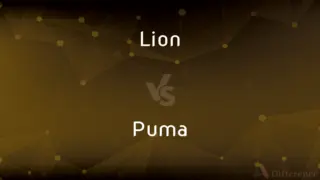
Previous Comparison
Lion vs. Puma
Next Comparison
Fever vs. PyrexiaAuthor Spotlight
Written by
Maham LiaqatEdited by
Tayyaba RehmanTayyaba Rehman is a distinguished writer, currently serving as a primary contributor to askdifference.com. As a researcher in semantics and etymology, Tayyaba's passion for the complexity of languages and their distinctions has found a perfect home on the platform. Tayyaba delves into the intricacies of language, distinguishing between commonly confused words and phrases, thereby providing clarity for readers worldwide.














